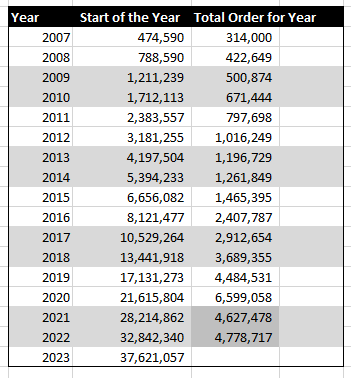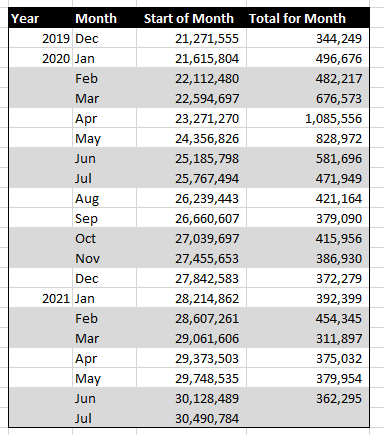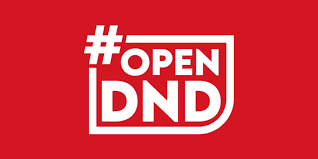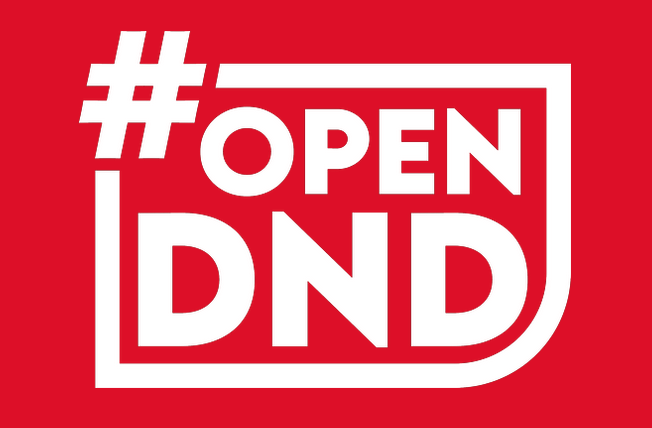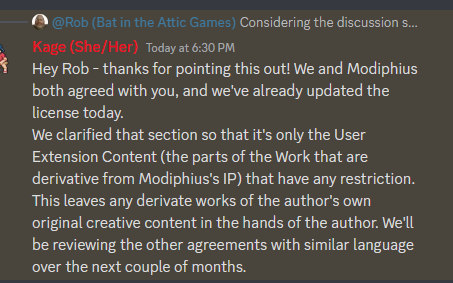I understand everybody is tired of Wizard's drama despite the good news. I appreciate that once again you have taken the time to read my post and hope the following is informative and useful.
Friday afternoon, Wizards of the Coast using DnD Beyond announced this.
The hobby and industry resounding NO! worked! With results far better than expected with the entirety of the 5e 5.1 SRD released under the CC-BY 4.0 license. The link is below.
Saying No!
The numbers were pretty clear even for an Internet survey.
- 88% do not want to publish TTRPG content under OGL 1.2.
- 90% would have to change some aspect of their business to accommodate OGL 1.2.
- 89% are dissatisfied with deauthorizing OGL 1.0a.
- 86% are dissatisfied with the draft VTT policy.
- 62% are satisfied with including Systems Reference Document (SRD) content in Creative Commons, and the majority of those who were dissatisfied asked for more SRD content in Creative Commons.
Coupled with the larger media world covering the story, and major investors being critical, the conditions for a victory fell into place last week.
The fact that the tabletop roleplaying industry and hobby spoke with one voice is amazing and we should all be proud of what each of us did to make this happen.
This can't be true, I don't just trust Wizards
The licensing of the 5.1 SRD under CC is done and the license terms of CC-BY 4.0 are irrevocable. So that part we can count as a win. A win that in my opinion counts as unconditional surrender. However, there remains some unfinished business to make sure there is peace and not a ceasefire.
The OGL 1.0a
Wizards have stated they will leave the OGL 1.0a in place.
However, one result of the last few weeks was the microscope that the OGL 1.0a was placed under. To avoid the problem of orphaned works. And to avoid impact on third parties who use the OGL to support other RPGs like Legend, Cepheus and the OSR. There needs to be an authorized OGL 1.0b released by WoTC.The two provisions that are needed are
- That Section 4, Grant and Consideration of the OGL incorporates the term irrevocable.
- That Section 1, Definitions, Includes a definition of authorization that states it refers to any license that has been officially released for use by third parties by Wizards. That license can not be deauthorized once released.
With these two provisions, the issue with orphaned works and creators using the OGL for non DnD systems can be mitigated greatly.
The Open RPG Content License (ORC)
The development of the ORC license needs to continue and be supported. The imminent loss of the OGL 1.0a and the ethos it represented made the industry and hobby realize just how important open gaming as a whole is. Not just for the DnD but for all the other creative projects that have been shared under the OGL. If the current plan is followed, then the ORC license itself will be under the control of an independent non-profit creating a level playing field as far as control of the license goes.
From both a business and creative perspective, everybody now realizes that independence from Wizards and the DnD Brand is of vital importance. DnD as an RPG system will remain first in the hobby's heart . With SRDs licensed under ORC the fate of the DnD system doesn't have to be tied to the fate of the DnD Brand. With the 5.1 SRD released under CC-BY 4.0. The creation of alternative SRDs has become a lot easier.
CC versus ORC
But why not just use one of the creative commons licenses, to begin with? Because of licensed content. If you are making an original system or setting, I agree it is a wash whether one uses CC or another license. Might as well go with the one (or none) that reflects your sentiments as to the sharing of your original work.
The point of open content licenses is to provide clarity. Letting people know what you, as the author, are OK with when folks remix your content. With traditionally licensed content, the owner IP decided that their content would only be licensed for a limited time under limited terms. The OGL recognized that by creating a way to clearly remix licensed content with open content. Doing this in a way that preserves the rights and permissions of both.
While Creative Commons has guidance on how to license only part of your work. It doesn't provide clarity and leaves it up to the author to how this is indicated. Something like ORC can help provide clarity by tailoring the spirit of Creative Commons to the conditions of our hobby and industry.
For online material: Select the license that is appropriate for your material from the CC license chooser and then follow the instructions to include the HTML code. The code will automatically generate a license button and a statement that your material is licensed under a CC license. If you are only licensing part of a work (for example, if you have created a video under a CC license but are using a song under a different license), be sure to clearly mark which parts are under the CC license and which parts are not. The HTML code will also include metadata, which allows the material to be discovered via Creative Commons-enabled search engines.
The D20 SRD and the D20 Modern SRD
In addition to changes to the OGL 1.0a, we need to press WoTC to release the d20 SRD and the d20 Modern SRD under a CC-BY license. These two works are foundational to many projects both DnD related and non DnD related. Plus doing this will disarm Wizard of many more terms (monsters, spells, etc.) to use for IP bullying and lawfare.
DriveThruRPG and the VTTs
There is little dispute that Wizard's DnD branded products, the DM's Guild, and licensed VTT modules, form the bulk of the business that DriveThruRPG and VTTs like Roll20, Fantasy Grounds, and Foundry do. Losing access to their platforms would be catastrophic for many publishers and authors including myself. Collectively they are an Achilles heel of our hobby and industry if Wizards uses its economic power to force unwanted changes for these platforms.
This is not theoretical either. Aside from the restriction of the now defunct VTT policy proposal. DriveThruRPG posted this on their discord server.
Note this sentence
Due to this, your titles will officially not be affected on any sites whether it is DTRPG and sister sites or the Roll20 Marketplace.So I would like to know what this was in alternative to if Wizards followed through on their initial plans?
Going Forward
I think we are in a midst of an inflection point in the history of the hobby and industry. That the events of the last three weeks will be marked as the beginning of when the hobby and industry charts an independent course from the DnD Brand and the company that owns it. Wizards will still compete but more and more it will be on a level playing field.
I know you are tired and want to have fun playing the games we love with people we enjoy playing with. While supporting the creators who help us make this happen. But the peace must be secured or it will be just a ceasefire.
So once again.
Fight On!




